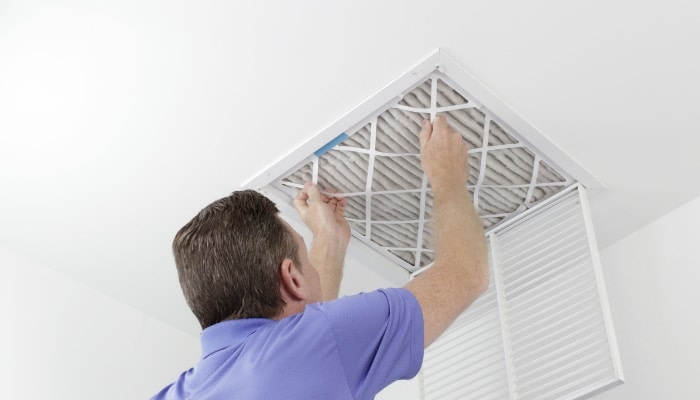
5 Things You Can Do To Extend The Life & Efficiency of Your Heating and Air Conditioning System
Birmingham’s weather can be unpredictable, swinging from humid summers to chilly winters. Your HVAC system works hard to keep your home comfortable year-round, but without proper maintenance, it could struggle when you need it most. Regular upkeep not only improves efficiency but also extends your system’s lifespan and prevents costly breakdowns.
Want to keep your heating and cooling running smoothly? Follow these five essential DIY HVAC maintenance tips!
1. Change Your Air Filter Regularly (And Pick the Right One!)
If you only do one thing for your HVAC system, make it this—change your air filter regularly! A clogged filter restricts airflow, making your system work harder and reducing efficiency. Dirty filters also contribute to poor indoor air quality, which can aggravate allergies and respiratory issues.
How Often Should You Change It?
- Every 1–2 months if you have pets, allergies, or live in a dusty area.
- Every 3 months for homes with no pets and good indoor air quality.
- Every month during peak seasons when your HVAC runs constantly.
What Type of Air Filter Should You Use?
- Fiberglass filters (cheapest, but need frequent replacement).
- Pleated filters (better filtration, last longer).
- HEPA filters (great for allergies, but check if your system can handle them).
Tip: Write the date on your filter when you change it so you don’t forget!
2. Get an Annual Professional Tune-Up
Okay so this one isn’t a DIY HVAC maintenance tip, but your HVAC system is like a car—it needs regular check-ups to run efficiently. A yearly tune-up ensures small issues don’t turn into major (and expensive) problems.
What Happens During a Professional HVAC Tune-Up?
- Checking refrigerant levels to ensure proper cooling.
- Inspecting and tightening electrical connections for safety.
- Cleaning evaporator and condenser coils for better performance.
- Checking the thermostat for accurate readings.
- Inspecting ductwork for leaks that could waste energy.
By scheduling a spring AC check-up and a fall heating tune-up, you can prevent unexpected breakdowns and keep your system running efficiently year-round.
3. Keep Your Outdoor Unit Clean and Clear
If you have a central AC system or heat pump, your outdoor unit needs some TLC too. Dirt, leaves, and debris can clog the condenser coils, making it harder for your system to release heat. This reduces efficiency and increases energy bills.
How to Maintain Your Outdoor Unit:
- Check it monthly and remove leaves, dirt, and debris.
- Trim back bushes and grass at least two feet around the unit for proper airflow.
- Gently clean the fins with a soft brush or hose (never use high pressure).
During the fall and winter, consider covering the unit to protect it from debris and harsh weather, but remove the cover before turning it on in the spring.
4. Seal Leaky Ducts to Improve Efficiency
Leaky ductwork can waste up to 30% of heated or cooled air, forcing your HVAC system to work overtime. This not only leads to higher energy bills but also makes it harder to maintain consistent temperatures in your home.
How to Detect and Fix Duct Leaks:
- Look for visible gaps or holes in exposed ductwork (usually in attics or basements).
- Feel for airflow leaks around duct joints while your system is running.
- Seal small leaks with mastic sealant or foil-backed tape (avoid regular duct tape—it won’t hold up over time).
If you suspect major duct leaks, it’s best to call an HVAC professional for a thorough inspection.
5. Optimize Your Thermostat Settings
A well-managed thermostat can reduce energy use and prevent unnecessary wear and tear on your HVAC system. If you’re still using a manual thermostat, upgrading to a programmable or smart thermostat is a game-changer.
Energy-Saving Thermostat Tips:
- Set it to 78°F in summer and 68°F in winter for optimal efficiency.
- Use a programmable schedule to adjust temperatures when you’re away or sleeping.
- Enable eco-mode on smart thermostats to automatically optimize energy use.
Smart thermostats also provide energy reports and remote control via smartphone apps, making it easier to fine-tune your comfort settings.
HVAC Facts and Stats for Birmingham Residents
- Birmingham experiences high humidity levels, which can make HVAC systems work harder, increasing energy consumption.
- The average lifespan of an HVAC system in the Birmingham area is 10–15 years, depending on maintenance and usage.
- A well-maintained HVAC system can reduce energy bills by up to 20% compared to a neglected one.
- The Alabama summer heat often pushes AC units to run longer, making regular maintenance crucial for efficiency and longevity.
Bonus DIY HVAC Maintenance Tip: Listen to Your HVAC System
Your HVAC system often gives warning signs when something is wrong. Don’t ignore unusual noises, weak airflow, or inconsistent temperatures—these could be early indicators of a bigger problem. Addressing small issues early can save you from costly repairs later.
Keep Your HVAC Running Strong with Pro Services
Regular maintenance is the key to keeping your HVAC system running efficiently and avoiding unexpected breakdowns. Whether you need a seasonal tune-up, duct sealing, or a thermostat upgrade, Pro Services is here to help Birmingham and surrounding communities stay comfortable year-round.
Want a hassle-free way to maintain your HVAC system? Check out our HVAC Maintenance Plan for scheduled tune-ups, priority service, and exclusive member discounts.
Need professional HVAC maintenance? Contact us online or call 205-966-9463 today!

